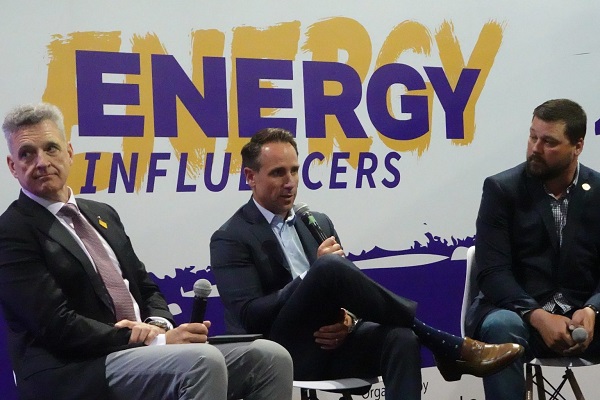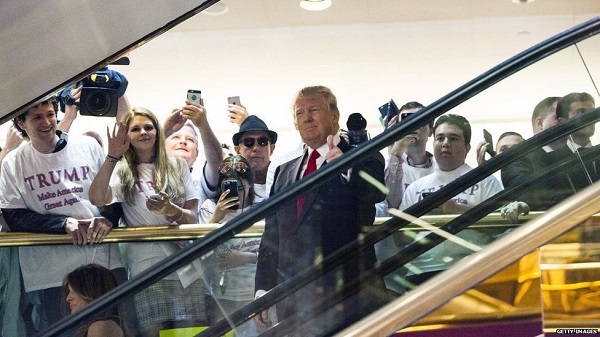Uncategorized
AP-NORC poll: 6 in 10 Americans blame Trump for shutdown

WASHINGTON — A strong majority of Americans blame President Donald Trump for the record-long government shutdown and reject his primary rationale for a border wall, according to a new poll that shows the turmoil in Washington is dragging his approval rating to its lowest level in more than a year.
Overall, 34
“Trump is responsible for this,” said poll respondent Lloyd Rabalais, a federal contractor from Slidell, Louisiana, who’s not affiliated with either political party.
The 47-year-old has been furloughed for more than a month. He said he’d need to start drawing on his retirement savings next week to pay his bills if the shutdown continues.
“I do support a wall, but not the way he’s handling it,” Rabalais added. “Trump guaranteed everybody that Mexico would pay for the wall. Now he’s holding American workers like me hostage.”
The drop in approval comes as Trump begins the third year of his presidency under the weight of the longest government shutdown in U.S. history, an international trade war that’s straining the global economy and new revelations about his push for a real estate deal in Russia during his 2016 campaign.
Compared with earlier presidents, Trump’s approval rating has been relatively stable over the course of his presidency, ranging from the mid-30s to the mid-40s.
By contrast, President Barack Obama never fell below 40
The new AP-NORC poll shows most Americans see the shutdown as a major problem, and they blame Trump far more than congressional Democrats for the mess that has ensnared the lives of roughly 800,000 government workers who are going without pay.
Sixty
Sixty-five
Trump may be popular overall with Republicans, but a sizable share holds him responsible for the current situation. Almost 3 in 10 Republicans think Trump bears a great deal of responsibility, while 73
“The large part of the responsibility belongs to the president because he made the decision,” said poll respondent Sandra Olson, of Northwood, Iowa. The 76-year-old registered Republican said she voted for Trump once and likely will again.
“We have never in my lifetime seen a president who has been so maligned and attacked and vilified,” Olson said.
Trump’s demand for a $5.7 billion border wall is also unpopular.
Overall, 49
About 7 in 10 supporters of the wall prefer to extend the shutdown than to reach a deal without funding it, while a nearly identical number on the other side would rather the shutdown continue than provide that funding.
The poll shows significant skepticism of the president’s argument that a wall would significantly reduce crime, stem the flow of illegal drugs or help the U.S. economy. The poll was conducted the week after Trump used such factors to justify his demand for the wall during a primetime address from the Oval Office.
In the nationally televised speech, he highlighted the case of one immigrant in the country illegally accused of beheading and dismembering an American citizen.
About 6 in 10 Americans do say the wall would at least slightly decrease the number of people entering the U.S. illegally, though only 3 in 10 think the number would significantly decrease. Yet just 35
On the economy, about as many Americans say the border wall would do more to help — almost 3 in 10 — as say it would do more to hurt; 43
Poll respondent Kelley Thorson, of St. Robert, Missouri, who backed Trump in the 2016 election, says she supports the wall but largely disagrees with the president’s rationale.
“I can’t say it would make us safer,” the 57-year-old said. “Criminals are going to get here no matter what.”
While partisan opinions of Trump have remained relatively constant throughout his presidency, the poll shows that disapproval has grown particularly among independents who do not lean toward either party.
Just 28
Women also are more likely to disapprove today compared with a month ago — 71
The president isn’t doing anything well right now, said poll respondent J. Edwin Hixson, a 71-year-old retired truck driver from Harrisburg, Pennsylvania, who didn’t vote for Trump or Democrat Hillary Clinton in the 2016 election.
“This isn’t a reality show. We’re in serious trouble,” he said.
___
The AP-NORC poll of 1,062 adults was conducted Jan. 16 to 20 using a sample drawn from NORC’s probability-based AmeriSpeak Panel, which is designed to be representative of the U.S. population. The margin of sampling error for all respondents is plus or minus 4.1 percentage points.
Respondents were first selected randomly using address-based sampling methods, and later interviewed online or by phone.
___
Online:
AP-NORC Center: http://www.apnorc.org/
___
Peoples reported from New York.
Steve Peoples And Emily Swanson, The Associated Press
Uncategorized
Kananaskis G7 meeting the right setting for U.S. and Canada to reassert energy ties


Energy security, resilience and affordability have long been protected by a continentally integrated energy sector.
The G7 summit in Kananaskis, Alberta, offers a key platform to reassert how North American energy cooperation has made the U.S. and Canada stronger, according to a joint statement from The Heritage Foundation, the foremost American conservative think tank, and MEI, a pan-Canadian research and educational policy organization.
“Energy cooperation between Canada, Mexico and the United States is vital for the Western World’s energy security,” says Diana Furchtgott-Roth, director of the Center for Energy, Climate and Environment and the Herbert and Joyce Morgan Fellow at the Heritage Foundation, and one of America’s most prominent energy experts. “Both President Trump and Prime Minister Carney share energy as a key priority for their respective administrations.
She added, “The G7 should embrace energy abundance by cooperating and committing to a rapid expansion of energy infrastructure. Members should commit to streamlined permitting, including a one-stop shop permitting and environmental review process, to unleash the capital investment necessary to make energy abundance a reality.”
North America’s energy industry is continentally integrated, benefitting from a blend of U.S. light crude oil and Mexican and Canadian heavy crude oil that keeps the continent’s refineries running smoothly.
Each day, Canada exports 2.8 million barrels of oil to the United States.
These get refined into gasoline, diesel and other higher value-added products that furnish the U.S. market with reliable and affordable energy, as well as exported to other countries, including some 780,000 barrels per day of finished products that get exported to Canada and 1.08 million barrels per day to Mexico.
A similar situation occurs with natural gas, where Canada ships 8.7 billion cubic feet of natural gas per day to the United States through a continental network of pipelines.
This gets consumed by U.S. households, as well as transformed into liquefied natural gas products, of which the United States exports 11.5 billion cubic feet per day, mostly from ports in Louisiana, Texas and Maryland.
“The abundance and complementarity of Canada and the United States’ energy resources have made both nations more prosperous and more secure in their supply,” says Daniel Dufort, president and CEO of the MEI. “Both countries stand to reduce dependence on Chinese and Russian energy by expanding their pipeline networks – the United States to the East and Canada to the West – to supply their European and Asian allies in an increasingly turbulent world.”
Under this scenario, Europe would buy more high-value light oil from the U.S., whose domestic needs would be back-stopped by lower-priced heavy oil imports from Canada, whereas Asia would consume more LNG from Canada, diminishing China and Russia’s economic and strategic leverage over it.
* * *
The MEI is an independent public policy think tank with offices in Montreal, Ottawa, and Calgary. Through its publications, media appearances, and advisory services to policymakers, the MEI stimulates public policy debate and reforms based on sound economics and entrepreneurship.
As the nation’s largest, most broadly supported conservative research and educational institution, The Heritage Foundation has been leading the American conservative movement since our founding in 1973. The Heritage Foundation reaches more than 10 million members, advocates, and concerned Americans every day with information on critical issues facing America.
Uncategorized
Poilievre on 2025 Election Interference – Carney sill hasn’t fired Liberal MP in Chinese election interference scandal

From Conservative Party Communications
“Yes. He must be disqualified. I find it incredible that Mark Carney would allow someone to run for his party that called for a Canadian citizen to be handed over to a foreign government on a bounty, a foreign government that would almost certainly execute that Canadian citizen.
“Think about that for a second. We have a Liberal MP saying that a Canadian citizen should be handed over to a foreign dictatorship to get a bounty so that that citizen could be murdered. And Mark Carney says he should stay on as a candidate. What does that say about whether Mark Carney would protect Canadians?
“Mark Carney is deeply conflicted. Just in November, he went to Beijing and secured a quarter-billion-dollar loan for his company from a state-owned Chinese bank. He’s deeply compromised, and he will never stand up for Canada against any foreign regime. It is another reason why Mr. Carney must show us all his assets, all the money he owes, all the money that his companies owe to foreign hostile regimes. And this story might not be entirely the story of the bounty, and a Liberal MP calling for a Canadian to be handed over for execution to a foreign government might not be something that the everyday Canadian can relate to because it’s so outrageous. But I ask you this, if Mark Carney would allow his Liberal MP to make a comment like this, when would he ever protect Canada or Canadians against foreign hostility?
“He has never put Canada first, and that’s why we cannot have a fourth Liberal term. After the Lost Liberal Decade, our country is a playground for foreign interference. Our economy is weaker than ever before. Our people more divided. We need a change to put Canada first with a new government that will stand up for the security and economy of our citizens and take back control of our destiny. Let’s bring it home.”
-

 espionage1 day ago
espionage1 day agoFrom Sidewinder to P.E.I.: Are Canada’s Political Elites Benefiting from Beijing’s Real Estate Reach?
-

 Business1 day ago
Business1 day agoSenator wants to torpedo Canada’s oil and gas industry
-

 Alberta1 day ago
Alberta1 day agoAlberta’s carbon diet – how to lose megatonnes in just three short decades
-

 Energy1 day ago
Energy1 day agoWho put the energy illiterate in charge?
-

 espionage1 day ago
espionage1 day agoFBI Buried ‘Warning’ Intel on CCP Plot to Elect Biden Using TikTok, Fake IDs, CCP Sympathizers and PRC Students—Grassley Probes Withdrawal
-

 David Clinton1 day ago
David Clinton1 day agoWhy Are Ontario’s Public Schools So Violent?
-

 Bruce Dowbiggin1 day ago
Bruce Dowbiggin1 day agoFUBAR: How Trudeau & Trump Rewrote This Century’s Political Handbook
-

 Business2 days ago
Business2 days agoRFK Jr. planning new restrictions on drug advertising: report






